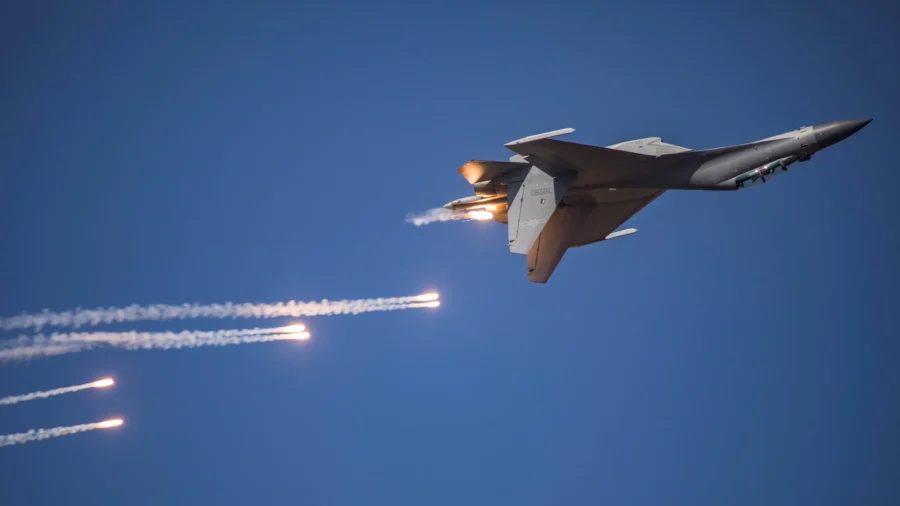A national survey of 2,500 citizens found that the majority of Americans now see China as an enemy, and an overwhelming majority sees wokeism and political mistrust as the main reasons they are discouraged from joining the U.S. military.
A survey by the Reagan Presidential Foundation & Institute found that more than half of Americans, or 51 percent, see China as the country posing the greatest threat to America. This number was 43 percent in 2022, increasing dramatically from 21 percent in 2018.
Also, a majority of 77 percent see China as an enemy, and only 15 percent now see it as an ally of the United States. In 2018, 55 percent saw China as an enemy (pdf).
The main concerns about China were the military buildup and its human rights abuses by its ruling communist party, while perception of the threat from the party’s economic practices subsided by five percentage points since 2022.
“In a time of increased global conflict, rather than backing away, Americans have shown their commitment to standing up against authoritarianism and bolstering U.S. global leadership,” Roger Zakheim, director of the institute, said in a press release.
“As Congress debates cutting defense spending, our leaders should consider the views of the American public, who expect our elected officials to strengthen America’s military and weaken our authoritarian adversaries,” he added.
In overall military capability, the majority of participants believe America has superiority over China—something misaligned with expert assessments, according to the authors of the survey.
On cyberspace, however, participants believe that China is better equipped than America, with 30 percent saying this versus 24 percent believing there is U.S. superiority.
“I think Americans are seeing that China’s undergoing a huge military buildup,” Reagan Foundation’s CEO David Trulio told Fox’s America’s Newsroom. “There’s been a lot of attention, appropriately, on the fact that China is engaged in an act of genocide against the Uyghurs in Xinjiang.”
Mr. Trulio also mentioned that Americans now see a “bigger backdrop of intellectual property theft and China’s bullying behavior in the South China Sea.”
A majority of 65 percent supported U.S. defense assistance to Taiwan without a Chinese invasion happening.
“I was just in Taiwan, and there’s unrelenting coercion economically, militarily on Taiwan. And look at what’s happened in Hong Kong with the national security law and the way they’ve cracked down on freedom. So it’s very concerning. And I think the American people are seeing the Chinese Communist Party for what it is,” Mr. Trulio said.
US Military
Over 70 percent of participants said that the biggest reason they would discourage someone from joining the U.S. military is the political climate, citing reasons of wokeness, distrust in politicians, and poor treatment.
Confidence in the military remains at record lows and has dropped sharply from 70 percent in 2018 to 45 percent in 2021, remaining the same to this year.

Ukraine
Over half of Republican participants and 75 percent of Democrats supported maintaining U.S. financial aid to Ukraine.
There is not a clear majority however on who is winning the war. Around 30 percent of participants think that Ukraine is winning, and a similar percentage think that Russia is winning.
America’s Direction
From 2018 to 2021, a slight majority of Americans said that the country is heading in the wrong direction. This year, this percentage increased to 70 percent. Democrat and Independent voters drove that increase.
Regarding the most concerning issues, 87 percent mentioned political divisions leading to violence in America, and 86 percent mentioned cyberattacks, followed by 81 percent concerned about terrorist attacks inside America. Rising authoritarianism around the world was immediately after that with 80 percent, and a war between America and China was at 75 percent.
A significant difference of opinion showed between Democrat and Republican votes over how concerned they were about the predicted risks from climate change, with 90 percent of Democrats finding it a concern versus 40 percent of Republicans. Conversely, more Republicans (82 percent) were more concerned about the possibility of a war with China versus 67 percent of Democrats.
Increased military spending got bipartisan support with 77 percent of participants saying they support it, along with 70 percent supporting more spending on border security.
The survey was conducted between Oct. 27 and Nov. 5. It was based on 945 phone interviews and 1,561 online surveys.

